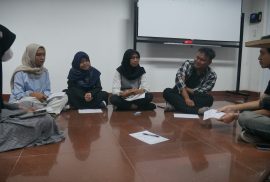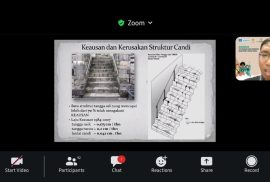Poetry is an activity that is favored by various groups, including young students. The freedom to create beautiful works of writing and literature that describe snippets or moments of life is poured through stanzas and lines that are not constrained by rigid rules. In the Faculty of Cultural Sciences UGM, the space to create poetry is made a place through student activities, the Semi-Autonomous Body Sanggar Lincak FIB UGM.
Starting from a collection of poetry fans among FIB UGM students who later formed a poetry community, Sanggar Lincak provides a space for FIB UGM students to gather and create together to produce poetry works with associations held every week at FIB UGM. Routine activities held by Sanggar Lincak such as Poetry Reading Classes and Rabun Senja which are open to the public, are an attraction for UGM Faculty of Arts students to participate and take part in poetry activities with other faculty students.
On Wednesday, March 20, 2024, Sanggar Lincak invited Public Relations of Faculty of Arts UGM to participate in regular weekly activities. Abyan Irsyad Fawzi, as the Head of BSO Sanggar Lincak guided the routine activities with 6 other students to create poetic creations with a special theme on that day, “Religiosity”. The students were given 15 minutes to compose their poetry creations and then read their respective poems. Each student was also given the opportunity to explain the background of the poem they composed.
Not only explaining the background, each student also shared their experiences and responded interactively to each other’s poems. This aims to build a sense of community and a safe space to not only poem, but tell stories. To know more about BSO Sanggar Lincak, students can visit through this Instagram link.






